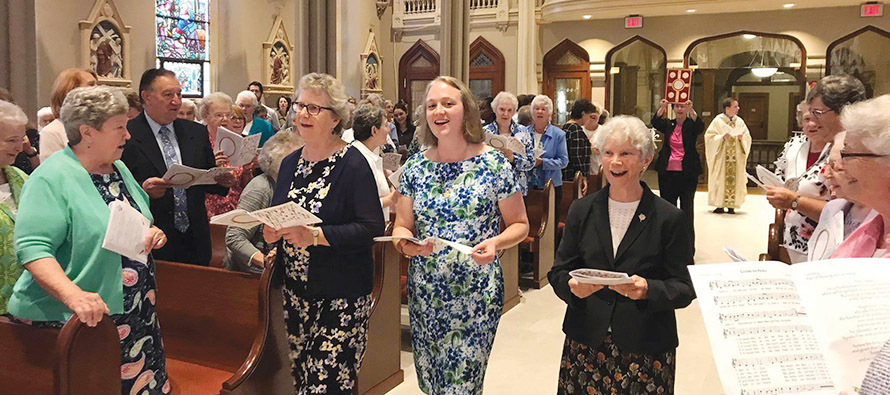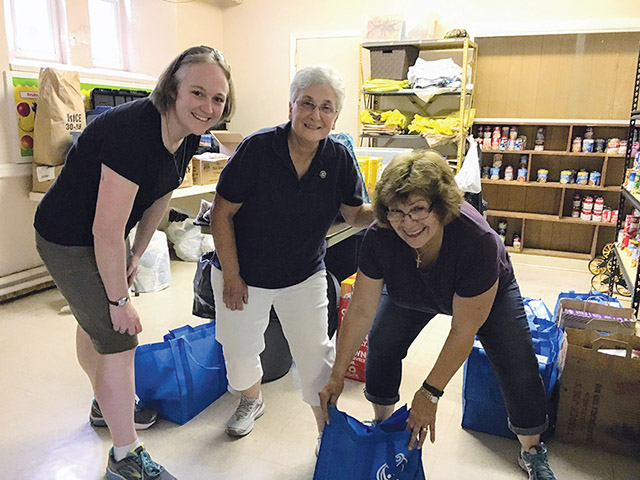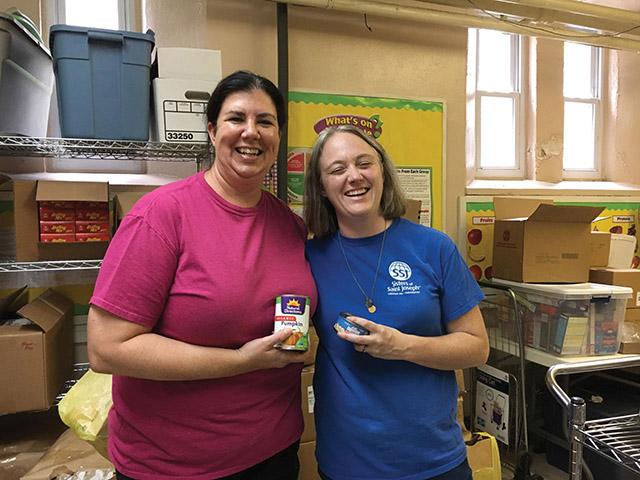Sisterhood is different from singlehood

Community is an element of sisterhood that supports members as they grow and develop in faith. Here, Sister Colleen Gibson, S.S.J.’s community surrounds her during her final vows ceremony. (Photos courtesy of Sisters of St. Joseph.)
WHEN I TOLD PEOPLE I was thinking about becoming a religious sister, they asked me the same questions: Why did I feel called? Why religious life? Or just plain, Why?
And once I told them about my desire to grow in my relationship with God, to serve others, and to live a radical life of intention in line with the gospel, the inevitable questions were: Why become a sister? Couldn’t you do all those things as a committed single woman?
Yes, I could have done all of those things as a committed single woman. I realized this as I discerned, so the bigger question for me was: What exactly is the difference between a committed single life and a vowed religious one?
The answer to that question is more complex than simple statements. It digs deep into the nature of call and vocation, uncovering who we are and what call truly means. Single life and religious life, after all, are both calls. Before we can look at how the two are different, it is helpful to understand what they have in common.
As Christians, we are called to live out our faith. The lives we lead reflect the love of Christ, and our vocations are the way in which we are most called to share that love with the world. Our true vocation enables us to be our most genuine selves as God created us to be.
The people who questioned me about why I was becoming a sister rather than staying single had my best interests in mind. I could do everything I sought to do as a committed single woman, but they missed one key point: discernment of a vocation is about more than you.
Vocation is about you and God—your deepest desires and God’s deepest desires for you. Discernment is about discovering those desires in relationship with God and naming what gives fullest life to that relationship. You don’t become a sister because of a lack of options, just as you ideally don’t remain single because nothing better has come along. You commit yourself to a way of life based on how your relationship with Christ calls you.
Single life and religious life each have their own gifts and challenges; each is a unique vocation with its own unique aspects.

Communal life
Life lived in community is one of the primary differences between a vowed religious life and a committed single one. Community is key to religious life. It encourages growth spiritually, individually, and interpersonally. Sisters live in community so they can bring communion to the world.
Communal life helps support a lifestyle of prayer. Prayer is essential to every vocation, and for me as a vowed religious, prayer is the grounding force of my vocation. Shared prayer brings my religious community together at various times throughout the day. Each religious order of sisters has its own style and manner of praying, but across congregations we all share an understanding that you can’t live a vowed religious life without personal and communal prayer. My community grows together and in relationship with God through prayer.
As we support one another in prayer, community life helps us foster the radical call to Christian discipleship lived out by vowed religious. We hold one another accountable. As a sister, I am continually challenged and learning to live in union and love—not only as I serve those most in need but with those closest to me, the sisters with whom I live.
Religious must learn to live together and strive to follow Christ’s teachings together, just like the first disciples did. Each person in a community brings her own personality, and that is one of the gifts and struggles of religious life. On our best days, communal life is a blessing; on more difficult days—when someone is in a bad mood, or when you find yourself criticized, or when a house meeting runs long—community provides opportunities for growth. Together we witness to the patience, trust, and compassion Jesus calls us to.
Living together, we support and challenge one another through the joys and sorrows of life. Community provides my sisters and me with companions for the journey. We are not family, yet living in community gives us the opportunity to live intentionally through shared decisions regarding what it means to live lives of simplicity, service, and prayer as a group.
Such decisions and communal living are based on two things: our charism and our vows.
Charism and vows
Every congregation of sisters has a unique charism (i.e., the manner in which a group lives out its gospel call). From Franciscan Sisters to Sisters of Saint Joseph, Adorers of the Precious Blood to Handmaids of the Sacred Heart, each community brings its own unique flavor to how its members live the gospel, uniting them in their life as religious sisters.

Just as charism unites sisters in community, publicly professed vows ground and distinguish our lives through our public witness to the gospel. While a woman living a single life may make her own commitments, a sister vows to live a life according to the “evangelical counsels” (or vows) of chastity, poverty, and obedience. These vows help define religious life. In poverty, chastity, and obedience, I give my life completely to God, witnessing to something greater than myself, affirming my sole reliance on God.
The vows reflect the way sisters are called to live and love. In poverty, we choose to live simply, proclaiming our dependence on God alone for all we truly need in life. In chastity, we declare the only love to which we are truly given is that of God—a love from which all other love comes. And in obedience, we vow to listen attentively to the call of God and the ways in which the Spirit is active in our lives, communities, and the world.
Public witness to faith
The public profession of vows is lived daily by sisters. Having the title “Sister” before your name makes you a public witness to the faith. You are a public representative of the church, your congregation, and faith in action at every moment.
This is true whether a sister wears a distinctive habit or not. Being a sister is different from being a committed single woman in the manner in which you are called to witness. As a sister, my life is consecrated to God. Even though those I minister to on the margins of inner-city life may not know what exactly a religious sister is, they are aware that the way I serve as “sister” is markedly different—radically available and truly present.
By my vows, I am called to be sister to all, encountering Christ, to whom I commit myself, in the everyday situations of life. This commitment holds me accountable to who I declare myself to be and calls me to authenticity, care, and compassion in all that I do.
The greatest freedom
From time to time, I still get the question of why I became a sister rather than committing myself to single life. “Surely, you would be freer,” the argument goes. In a way, I would. Free from the structures of community, I could do what I want. Without vows, I could live on my own terms. Obedient to God’s will for my life alone, I could focus on specific projects without having to consider a congregation.
All of this is true; I could still live my faith, love God, and witness to something greater as a single woman. Yet for me, being true to myself is the greatest freedom there is, and I am most truly myself as a sister. To the question of why, my answer is: “My whole life.”
A version of this article originally appeared in Vision 2016. Related articles: VocationNetwork.org, “Six myths about becoming a nun” and “Why I’m a Catholic sister.”
For more on how to become a nun, how to become a Catholic sister, how to know your vocation, how to know God's will for you, what is it like to be a nun or Catholic sister, browse our article archive.
Tags
- catholic sister
- catholic nun
- catholic vocation
- becoming a sister
- knowing gods call
- community life as a nun
- vows of catholic nuns and sisters
Related
- A vocation found on the low road: Profile of Sister Thanh Pham, S.S.M.O.
- Missioned to make connections
- Need-to-knows about becoming a nun
- An art teacher is drawn to something greater: Profile of Sister Lisa Perkowski, I.H.M.
- What a flock of sheep taught its shepherdess
- Sister Vilma’s fearless faith
- Seeing God in a child’s smile: Profile of Sister Marie Elizabeth Jerry, S.S.F.
- Bringing sacred healing to hurting communities
- Sisters help Uvalde move from trauma to trust
- Camaraderie at its best: Profile of Sister Kristine Fernandes, C.S.J. Read More
Most Viewed
- Find your spirituality type quiz
- Questions and answers about religious vocations
- Celibacy quiz: Could I be a nun? Could I be a brother? Could I be a priest?
- Resources for older discerners or those with physical and developmental differences
- About Vocation Network and VISION Guide


